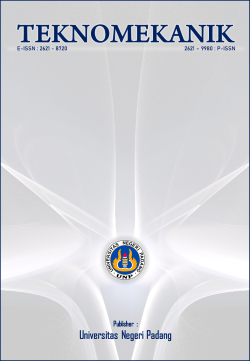Management of industrial class in vocational education
DOI:
https://doi.org/10.24036/jptk.v3i2.6823Keywords:
Management, industry class, vocational educationAbstract
This study aims to describe the management of industrial classes in SMK Muhammadiyah 2 Ajibarang. This research uses a qualitative type with a case study approach. Research subjects were the deputy head of public relations, the deputy head of the curriculum, the head of the engineering engineering program, the head of the light vehicle engineering program and the head of the motorcycle engineering expertise program. Place of research at SMK Muhammadiyah 2 Ajibarang. Data collection techniques using interviews, observation, and documentation. The collected data were analyzed with the model of Miles, Hubermen, and Saldana. Research data 1) Industrial class planning includes aspects of students carried out by industry and schools as the organizer. The human resource aspect is carried out by means of instructor training organized by industry to increase knowledge about the industry. The curriculum aspect is carried out by synchronizing the school curriculum with the industrial curriculum, then the aspect of infrastructure facilities is carried out by industry and schools with industrial involvement in the form of setting industry class standards and procuring infrastructure and forms of school involvement in the form of procurement. 2) The implementation of industrial classes includes learning that is adjusted to the established curriculum and the internship carried out in the industry. 3) evaluation which includes evaluating student learning outcomes, in the form of students getting certificates from the industry and evaluating the implementation of industrial classes in the form of internal meetings and visits made by schools to industry and industry to schools
Downloads
References
Amirin, T. M. (1986). Pokok-pokok teori sistem. https://api.semanticscholar.org/CorpusID:70346872
Arfandi, A., & Makasar, F. T. U. N. (2009). PELAKSANAAN PRAKTEK KERJA INDUSTRI SISWA SMK PROGRAM KEAHLIAN TEKNIK BANGUNAN DI KOTA MAKASSAR. Cakrawala Pendidikan.
Hidayat. (2014). Metode Penelitian Keperawatan. Eprints.Poltekkesjogja.Ac.Id.
Kompri. (2015). Manajemen Pendidikan: Komponen-komponen Elementer Kemajuan Sekolah. In Yogyakarta: Ar-Ruzz Media.
Malthis, R. L., & Jackson, J. H. (2006). Human Resource Management (Manajemen Sumber Daya Manusia), edisi kesepuluh, terjemahan: Diana Angelica. In Penerbit: Salembs Empat, Jakarta.
Miles, A. M. H. M. B. J. S. (2014). Qualitative Data Analysis a Methods Sourcebook. In SAGE (Issue 1).
Noe, R. A., Hollenbeck, J. R., Wright, P. M., & Gerhart, B. A. (2019). Human Resource Management: Gaining a Competitive Advantage, 11th ed. https://api.semanticscholar.org/CorpusID:202365821
Noor, A., Radiansyah, A., Selfiana, Ishak, R. P., Hakim, C., Rijal, S., Harto, B., Tinambunan, A. P., Rustiawan, I., Purwatmini, Ni., Parlina, L., Arta, D. N. C., Khamaludin, Napisah, S., & Hendriana, T. I. (2023). Human Resource Management (Manajemen Sumber Daya Manusia). In Salemba Empat (Issue March).
Sikula, A. F. (1976). Personnel administration and human resources management. https://api.semanticscholar.org/CorpusID:166760846
Slamet, M. A., Yoto, Y. Y., & Widiyanti, W. W. (2017). Studi pengelolaan kelas honda pada program keahlian teknik sepeda motor di SMK Negeri 9 Malang. https://api.semanticscholar.org/CorpusID:188584156
Sudira, P. (2006). Pembelajaran di SMK. Departemen Pendidikan Nasional.
Terry, G. R. (1996). Principles of management / George R. Terry. https://api.semanticscholar.org/CorpusID:160913036
Yamin, Moh. (2012). Panduan manajemen mutu kurikulum pendidikan / Moh. Yamin. https://api.semanticscholar.org/CorpusID:181073303
Zainal Arifin. (2019). Evaluasi Pembelajaran : Prinsip, Teknik, Prosedur. PT. Remaja Rosdakarya: Bandung. Evaluasi Pembelajaran Prinsip, Teknik, Prosedur. PT Remaja Rosdakarya.
Zulhardi, H. (2019). Konsep Dasar Administrasi dan Manajemen Pendidikan. https://api.semanticscholar.org/CorpusID:241970291
Downloads
Published
How to Cite
Issue
Section
License
Copyright (c) 2020 Puguh Priambudi, Fitri Nur Mahmudah, Edhy Susatya

This work is licensed under a Creative Commons Attribution 4.0 International License.





